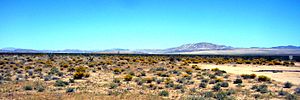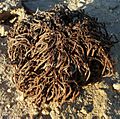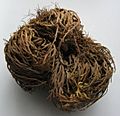Tumbleweed facts for kids
A tumbleweed is a plant structure that breaks off from its roots or stem when it's mature. It then rolls across the ground, pushed by the wind. This helps the plant spread its seeds to new places. Tumbleweeds are often found in dry, open areas like steppes (grassy plains) and arid (very dry) ecosystems. The strong winds and wide-open spaces in these areas make it easy for them to roll.
Most of the tumbleweed structure is actually dead plant material. This is important because the structure needs to break apart as it rolls. This way, its seeds or spores can escape and fall onto the ground. Sometimes, if a tumbleweed stops in a wet spot, its seeds might start to grow. Many tumbleweed species have a clever trick: they open up when they get wet, releasing their seeds as they soak up water.

How Tumbleweeds Spread Seeds
The way a tumbleweed spreads its seeds is called seed dispersal. This method isn't just used by plants that make seeds. Some plants that produce spores, like certain types of Selaginella, also form tumbleweeds. Even some fungi, which look like puffballs, can dry out, break free, and roll in the wind, spreading their spores as they go.
Examples of Tumbleweeds
-
Anastatica, a North African desert tumbleweed
-
Selaginella lepidophylla, a North American desert tumbleweed
See also
 In Spanish: Estepicursor para niños
In Spanish: Estepicursor para niños
 | George Robert Carruthers |
 | Patricia Bath |
 | Jan Ernst Matzeliger |
 | Alexander Miles |








